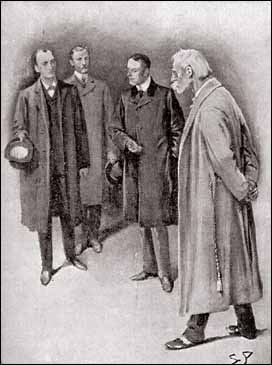| The Six Napoleons 3 | The Six Napoleons 4 |
The development for which my friend had asked came in a quicker and an infinitely more tragic form than he could have imagined. I was still dressing in my bedroom next morning, when there was a tap at the door and Holmes entered, a telegram in his hand. He read it aloud:
“Come instantly, 131 Pitt Street, Kensington.
“LESTRADE.”
“What is it, then?” I asked.
“Don’t know – may be anything. But I suspect it is the sequel of the story of the statues. In that case our friend the image-breaker has begun operations in another quarter of London. There’s coffee on the table, Watson, and I have a cab at the door.”
In half an hour we had reached Pitt Street, a quiet little backwater just beside one of the briskest currents of London life. No. 131 was one of a row, all flat-chested, respectable, and most unromantic dwellings. As we drove up, we found the railings in front of the house lined by a curious crowd. Holmes whistled.
“By George! it’s attempted murder at the least. Nothing less will hold the London message-boy. There’s a deed of violence indicated in that fellow’s round shoulders and outstretched neck. What’s this, Watson? The top steps swilled down and the other ones dry. Footsteps enough, anyhow! Well, well, there’s Lestrade at the front window, and we shall soon know all about it.”
The official received us with a very grave face and showed us into a sitting-room, where an exceedingly unkempt and agitated elderly man, clad in a flannel dressing-gown, was pacing up and down. He was introduced to us as the owner of the house – Mr. Horace Harker, of the Central Press Syndicate.

“It’s the Napoleon bust business again,” said Lestrade. “You seemed interested last night, Mr. Holmes, so I thought perhaps you would be glad to be present now that the affair has taken a very much graver turn.”
“What has it turned to, then?”
“To murder. Mr. Harker, will you tell these gentlemen exactly what has occurred?”
The man in the dressing-gown turned upon us with a most melancholy face.
“It’s an extraordinary thing,” said he, “that all my life I have been collecting other people’s news, and now that a real piece of news has come my own way I am so confused and bothered that I can’t put two words together. If I had come in here as a journalist, I should have interviewed myself and had two columns in every evening paper. As it is, I am giving away valuable copy by telling my story over and over to a string of different people, and I can make no use of it myself. However, I’ve heard your name, Mr. Sherlock Holmes, and if you’ll only explain this queer business, I shall be paid for my trouble in telling you the story.”
Holmes sat down and listened.
| The Six Napoleons 3 | The Six Napoleons 4 |